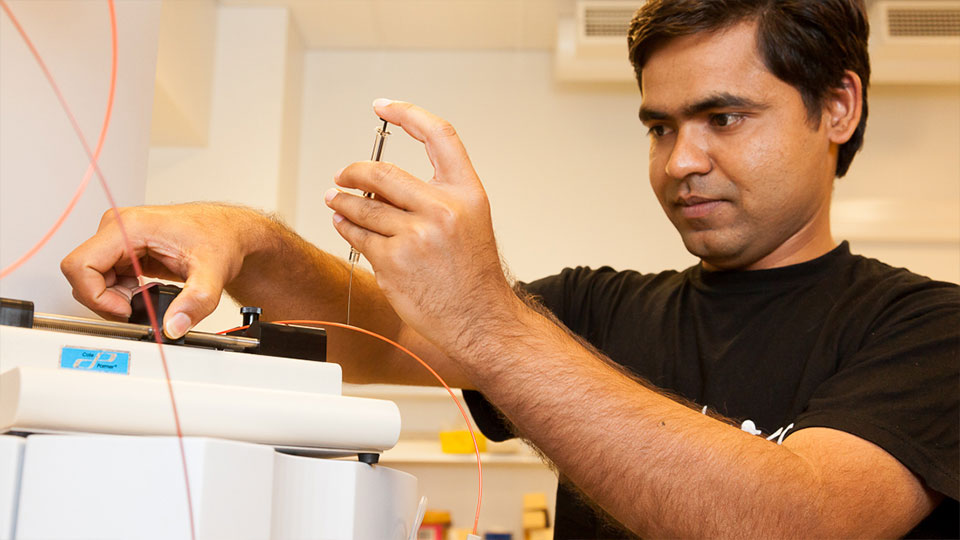Master's Degree Programme in Exact Sciences: Chemistry of Materials for Sustainable Development
The Chemistry of Materials for Sustainable Development (previously called Materials Chemistry) specialisation track teaches you to understand, discover, create and develop new materials that improve quality of life!
Meet programme staff at Virtual Open Week on 20 Nov at 14.30!
At the University of Turku, the research in materials chemistry consists of fundamental research of material properties as well as that of interfaces, surfaces, and nanostructures from a chemical point of view. Applied research focuses on functionalized organic electronics, luminescent materials, and porous carriers as well as nanotechnology, detection technology, energy storage, and conversion.
Upon graduation, you will be able to use the diverse set of skills acquired as part of this track, including experimental, theoretical, and numerical techniques to produce and analyze new chemical projects.
The Chemistry of Materials for Sustainable Development track is one of the six specialisation tracks of the Master’s Degree Programme in Exact Sciences (previously called the MDP in Physical and Chemical Sciences). The other tracks of the programme are
- Astronomy and Space Physics
- Chemistry of Drug Development
- Materials Physics
- Mathematics and Statistics
- Theoretical Physics.

Entry requirements
General Requirement
You are an eligible applicant for Master’s-level studies if
- you have a nationally recognized first cycle degree – normally a Bachelor’s degree – from an accredited institution of higher education,
- your degree corresponds to at least 180 ECTS (European credits) or three years of full-time study,
- your degree is in a relevant field for the Master’s degree programme that you’re applying to. Please check the section on track-specific admission requirements for detailed degree requirements.
Language Requirements
Applicants must have excellent English language skills and a certificate that proves those skills. You can indicate your language skills by taking one of the internationally recognized English language tests.
Applicants must reach the minimum required test results to be considered for the University of Turku. No exceptions will be made. Read more about the language requirements here.
Study right
It is not possible to have more than one Bachelor’s or Master’s study right at the same Faculty. Therefore, when accepting an offered study place, the student will lose any previous BSc. or MSc. study right at the Faculty of Science at the University of Turku.
Before you start preparing your application, always read the full admission requirements on the application portal Studyinfo.fi
The applicant’s previous degree, based on which s/he is seeking admission to the Master’s Degree Programme in Exact Sciences, must be in a relevant field of study. Relevant fields of previous studies for the Chemistry of Materials for Sustainable Development track are
- chemistry
- materials science
- or similar
You may not apply to more than one specialization track within the same Master’s Degree Programme at the University of Turku. Therefore, you should carefully consider the suitability of your educational background for the applied track.
The decision of admission will be based on
- the relevance of the applicant’s awarded degree(s)
- the amount, relevance, and grades of the courses in the degree(s)
- the language test result (see Language requirements)
- the motivation letter (see full entry requirements for the obligatory motivation letter template)
- relevant track-specific methodological knowledge
- possible interview
The academic evaluation is made only for complete applications received during the application period. Any preliminary assessment of suitability or chances for admission will not be given.
Programme in brief
The structure of the programme is modular and each specialization track has three obligatory modules that contain the core material of the field. These include the MSc thesis (30 ECTS), lecture and exercise courses, seminars, laboratory work, internship or project work, details of which depend on the specialization. In addition, there is one thematic module that may be chosen to support your own study plan. The fourth module consists of freely chosen courses and obligatory Finnish language courses (5 ECTS).
The specialisation track Chemistry of Materials for Sustainable Development is a two-year programme of 120 ECTS credits. The curriculum is comprised of:
- Core Courses (20 ECTS) and laboratory project (20 ECTS) in Chemistry of Materials for Sustainable Development
- Specialisation Studies in Chemistry (20 ECTS)
- Master’s thesis and related courses (40 ECTS)
- Other studies including mandatory language studies and selectable studies in different thematic areas and special themes (20 ECTS)
All students take the same core courses and select specialisation courses and related laboratory projects. Master’s thesis is made under the same research area.
Each student makes a personal study plan which helps to select the courses that best suit for personal interests and background of the student.
The University of Turku fosters students' professional growth and global perspective by promoting internships and student exchanges. Every degree student can take advantage of these opportunities – internship subsidy is available for all degree students that find a suitable internship position and every exchange programme includes a grant.
Does this page answer your questions about the programme's content and academic matters? If not, contact infoscitech@utu.fi.
The aim of the Master’s education is to support you to become an independent expert who can evaluate information critically, plan and execute research projects to find new knowledge, and to solve scientific and technological problems independently and as a part of a group.
In the University of Turku the research in Chemistry of Materials for Sustainable Development consists of fundamental research of material properties as well as that of interfaces, surfaces, and nanostructures from chemical point of view. Applied research focuses on functionalised organic electronics, luminescent materials and porous carriers as well as nanotechnology, detection technology, energy storage and conversion.
The Thesis Project will form the basis for your Master’s Thesis. This laboratory project is a part of a true research project taking place in the department and made under the guidance of a supervisor. The Master’s thesis will be written based on the results from the laboratory project and a review of relevant background literature.
It is possible to conduct the laboratory project in some other University or in the industry as well.
Examples of thesis topics:
- Selective conversion of carbon dioxide to high-value chemicals
- Developing new deposition ways of perovskite structures
- Characterization of new ionic liquids
The Master’s Degree Programme in Exact Sciences has six tracks. A short description of this specialisation track is given below. You can find more detailed information on tracks from the specific site of each track by clicking on the links below.
The studies of Chemistry of Materials for Sustainable Development and Materials Physics give you an ability to understand and develop the properties of materials from molecules and nanoparticles via metals, magnetic and semiconducting compounds for pharmaceutical and biomaterial applications. After graduation, you will be familiar with the current methodologies, research equipment, and modern numerical methods needed to model properties of materials used in research and technology.
Other tracks:
Chemistry of Drug Development, Astronomy and Space Physics, Mathematics and Statistics, Materials Physics, and Theoretical Physics.
Career prospects
The Master of Science degree provides the skills to work in many different kinds of positions within areas such as research and development, education and management, and industry. The specialisation track in Chemistry of Materials for Sustainable Development provides especially good opportunities for working in research and development positions in industrial technology.
Graduates from the Chemistry of Materials for Sustainable Development program possess knowledge about new materials and their modification and characterisation as well as of how to apply them. Graduates are also highly capable to operate advanced instrumentation for materials characterisation.
The prospects for employment at relatively senior levels are excellent for those trained in the physical and chemical sciences. Thanks to the broad scope of the programme, the skills, and knowledge developed as part of this education at the University of Turku provide many employment opportunities in different areas.
As a materials chemist, you can either go on for further studies for a career in academics or be hired by the industry in a wide range of specialisation, from Biofuel production, metal industry, nanotechnology, energy conversion, displays, drug detection, and delivery, etc.
The Master’s Degree provides eligibility for scientific postgraduate degree studies. Postgraduate degrees are doctoral and licentiate degrees. The University of Turku Graduate School – UTUGS has a Doctoral Programme in Exact Sciences, and covers all of the disciplines of this Master's Degree programme. Postgraduate degrees can be completed at the University of Turku.
Note that in Finland doctoral studies incur no tuition fees, and Ph.D. students often receive either a salary or a grant to cover their living expenses. The Master’s programme is a stepping stone for Ph.D. studies.

